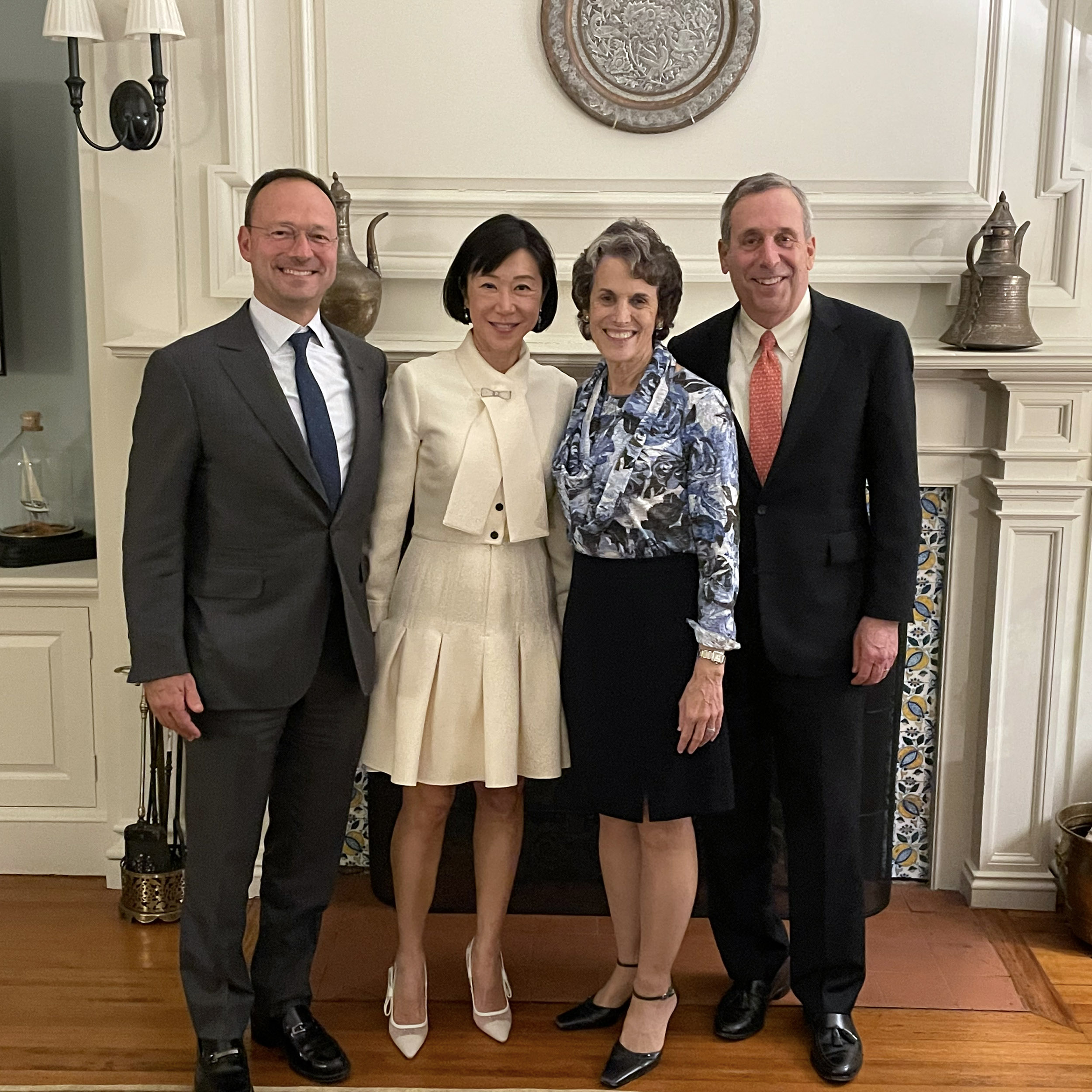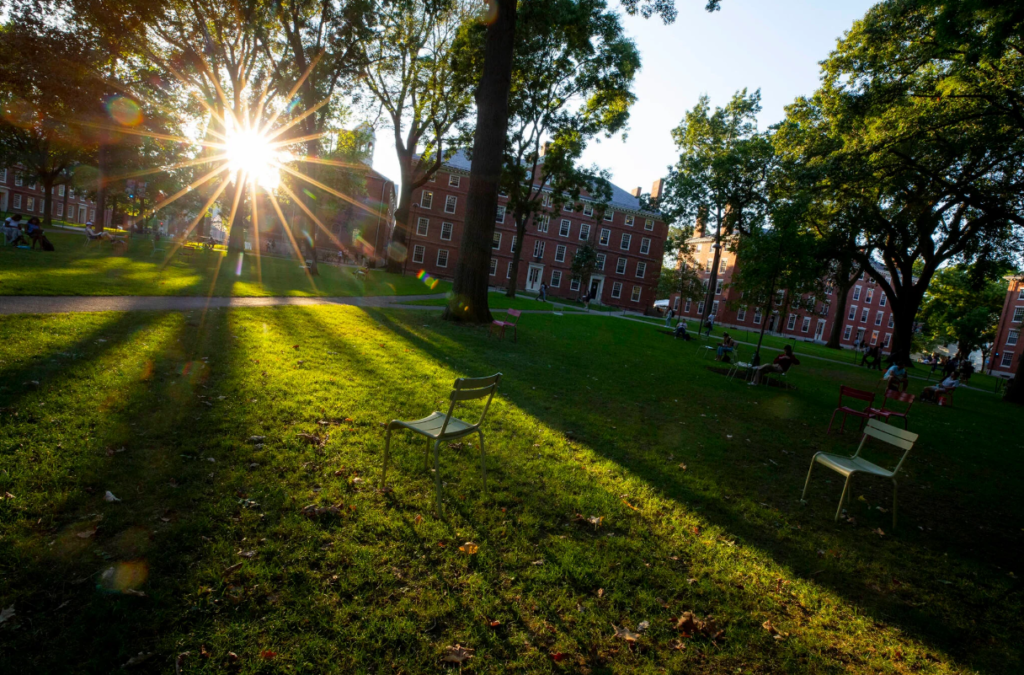Salata Institute for Climate and Sustainability made possible by $200M gift from Melanie and Jean Salata
Harvard University on Tuesday announced the creation of the Salata Institute for Climate and Sustainability, a groundbreaking new entity that will advance and catalyze research programs across all of Harvard’s Schools and enable comprehensive cross-University education in climate and the environment.
Building on work developed over decades at Harvard, the Salata Institute will launch in fall 2022 and be led by Vice Provost for Climate and Sustainability Jim Stock with a mission to develop and promote durable, effective, and equitable solutions to the climate-change challenges confronting humanity. The Institute is made possible by a $200 million gift to Harvard from Melanie and Jean Eric Salata. Jean Salata is the chief executive and founding partner of Baring Private Equity Asia, which recently announced that it was merging with the global private equity firm EQT.
“The Salata Institute for Climate and Sustainability at Harvard represents a once-in-a-generation opportunity to tackle the climate crisis by leveraging and unifying Harvard’s strengths. It will draw together expertise from across the University in ways we’ve only just begun to imagine,” said President Larry Bacow. “Melanie and Jean’s extraordinary generosity is matched only by their passionate belief that the time is now for bold action that engages the public. We are grateful beyond measure for their vision and for their support as we undertake critical work on behalf of humanity — and for the sake of our planet.”

The Institute will pursue a pathbreaking approach to the climate challenge — one that aims to grow and galvanize the network of climate-focused scholars across Harvard, create new pathways for student education and participation in the development of climate and sustainability solutions, and add critical focus on significant, real-world progress with near- and long-term impact. It will also act as a hub and connection point for the many existing climate-related programs and initiatives across the University.
“Climate change is one of the most pressing issues of our time. It is a crisis whose impact will affect our children and many generations to come, and we have a responsibility to them to do everything we can to address it,” the Salatas said. “Through initiatives like the one we are announcing today, and many others like it globally, we can harness the power of the world’s best researchers and most talented policy and business leaders to create a more sustainable future for all of us.”
The Salata Institute will spur and support influential research on climate, sustainability, and the transition to low- and zero-carbon energy; equip Harvard students to become the next generation of leaders and change agents in the field; and recruit and support faculty who will bring their expertise to bear on the complex and daunting challenges brought about by climate change.
“This is a momentous step for Harvard’s efforts in climate and sustainability,” said Stock. “The Salata Institute will be the key institutional structure driving the University’s goals in climate: to increase research, education, and public engagement that make a real difference in tackling the climate crisis. Climate change has so many facets, from ever-worsening physical consequences, to harms to human health and ecosystems, to the economics, law, politics, and engineering of the enormous but necessary transition to a net-zero-emissions economy, to the changes to society wrought by climate change and the energy transition. With its current strengths, international convening power, and great potential, Harvard has a unique responsibility to lead in addressing these challenges. The Salata Institute will empower Harvard to get on with this difficult but essential work.”
One of the Institute’s key research initiatives will be the new faculty-led Climate Research Clusters Program, which will develop multidisciplinary collaborations with real-world potential for change. The first round is currently underway, with 41 concept proposals received from researchers across the University. Final selection is slated for this fall, with projects launching in January 2023.
In addition to the new Clusters program, the Institute will provide small grants for researchers not yet working on climate who want to expand their focus to this area, as well as those currently working on climate who want to explore new ideas. Larger project grants will continue to be available (now, through the Institute) from the Climate Change Solutions Fund, established in 2014, which has been successful in supporting big ideas now coming to fruition. The research efforts of the Salata Institute will be coupled with external engagement of climate leaders from the public, private, and nonprofit sectors to ensure Harvard’s cutting-edge climate research is translated into actionable solutions.
“The Salata Institute will bring together the diverse intellectual strengths of all parts of the University with the deep and widely shared passion to address the crisis in climate and sustainability,” said Alan Garber, Harvard University’s Provost. “We cannot solve the climate crisis on our own, but we expect our educational and research efforts to produce deep and lasting contributions to the broader effort, in which universities will play leading roles. Harvard can do nothing less than set the example for effective leadership in addressing all aspects of climate change. This gift will enable us to do so.”
A key component of the Salata Institute is supporting the expansion of climate education opportunities both on the Harvard campus and beyond. Those efforts include assisting the Schools by supporting course development and by providing new opportunities for students interested in exploring careers in climate and sustainability, for example by expanding student internship and research possibilities, augmenting opportunities currently available through the Harvard University Center for the Environment. In addition, the Salata Institute will serve as a hub connecting Harvard students with alumni working in climate and sustainability.
“The challenges of the climate crisis are immense and urgent,” said Stock. “I am thrilled, and deeply grateful, that Jean and Melanie have turned to Harvard to help make this lasting commitment at a time when the world needs it most.”
Article Credits: The Harvard Gazette

Pingback: Climate crisis costing $16m an hour in extreme weather damage, study estimates - SLSV - A global media & CSR consultancy network
Pingback: Patagonia founder just donated the entire company, worth $3 billion, to fight climate change - SLSV - A global media & CSR consultancy network